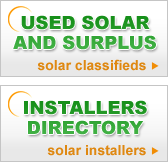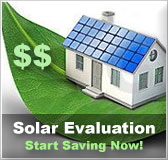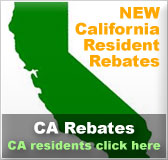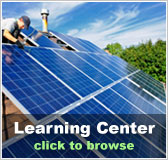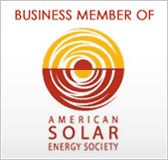Renewable energy property tax exemption:
-This statue allows 100% of renewable energy equipment to be tax
exempt.
-Eligible renewable energy technologies include solar thermal, photovoltaics,
wind, biomass, hydroelectric, geothermal electric and landfill gas.
Midwest Energy – How smart energy efficiency finance
program:
-This program is designed to help customers finance energy efficiency
improvements on their homes or properties.
-The utility pay the initial cost of the energy improvements and customers
pay the utility back through a surcharge on each monthly bill until
it has been paid back in full.
-Interest rate is set at 4% and customers are given a 15-year payback
period.
-To be accepted into this program, customers must have an energy audit
performed on their property.
Kansas City Power & Light – Energy Star new homes
rebate program:
-Kansas builders who achieve the Energy Star rating label on their
buildings qualify to receive a rebate of $800 per Energy Star rated
home.
Net Metering:
-Net Metering allows customers to connect renewable energy systems
to the grid for their own use and to supply excess electricity to
the electric grid.
-Residential customer-generated electricity may be from solar, wind,
small hydropower, or fuel cell systems of up to 25 kW in size.
-Net excess generation produced in a one month period is credited
to the customer's next bill indefinitely by the utility.
Residential renewable energy tax credit:
-This personal tax credit allows the taxpayer to claim a credit of
30% of expenditures including labor costs and installation of qualified
residential solar-electric systems, solar water heating systems or
fuel cells. Small wind-energy systems and geothermal heat pumps can
also be accredited for.
-Solar-electric systems and solar water heaters have a maximum incentive
of $2,000 if placed in service before 2009. There is no maximum incentive
for systems placed after 2008.
-The excess amount of the federal tax credit may be carried forward
to the next taxable year if it exceeds tax liability.
-This can be carried forward until 2016, but after that, it is unknown
if the unused credit will be able to be forwarded.
Residential energy conservation subsidy exclusion:
-This is a personal exemption of 100% of energy conservation subsidies
provided by public utilities.
-The value of a purchase or installation of any energy conservation
measure by a customer such as solar water heat, solar space heat or
photovoltaics will not be included in the customer’s gross income.
-Customers of an electric utility company, who participate in the
utility’s energy conservation program, may receive a rate reduction
of electricity furnished or a nonrefundable credit against the purchase
price of the electricity on each monthly electric bill.
Energy-efficient mortgages:
-This is a federal loan program where homeowners can use EEM (energy-efficient
mortgages) to finance renewable energy technologies in a home.

